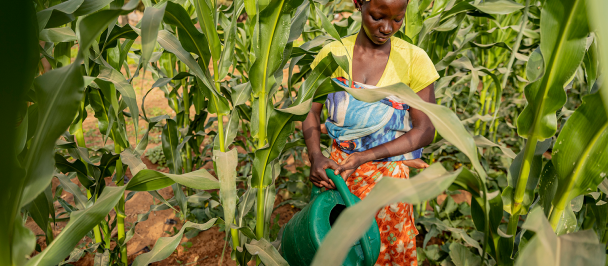“The ecological crisis that we are in is really a spiritual crisis”

ORFC in Oxford Town Hall
The Oxford Real Farming Conference, held in the UK university city every January, was launched in 2010 and is now the largest agroecological conference in the world. The 2025 event brought together nearly 2000 farmers, food producers, and advocates for sustainable agriculture, uniting voices from across the globe to cultivate hope and action for a just and resilient food system.
Real Farming Trust Executive Director Francesca Price said: “The Listening to the Land strand of the conference came out of a desire from delegates to address how we come into a more reciprocal relationship with Nature and how a more mindful, conscious, even heart-based approach to our work can support the transformation of our food and farming system. We were delighted to work with partners the Conscious Food Systems Alliance (CoFSA) and Animate Earth to seed sessions through the conference programme that explore traditional and indigenous knowledge systems, and farming practices based on an intuitive relationship with the land.”
The UNDP-convened CoFSA co-created a pre-conference day on Listening to the Land, a sell-out event with more than 120 participants. A packed conference session, “Land, Food and Spirit” brought these topics to mainstream delegates.
“As agents of change for food systems transformation, we feel and realize the importance of our connection to the land, nature and food but find it challenging to express this connection and bring it into our day-to-day work. So we need to make spaces to openly share how we feel connected and why the connection is so important to how we shape and evolve food systems” said UNDP’s Global Head of Food and Agricultural Commodity Systems, Andrew Bovarnick.

Land, Food and Spirit in Wesley Memorial Methodist Church
The main conference event, “Land, Food and Spirit” examined how our inner capacities help transform our approach to food and farming. Biodynamic farmer Patrick Holden, founder of the Sustainable Food Trust, opened the event: “I feel that the ecological crisis that we are in is really a spiritual crisis and unless we can connect these two we’re not going to achieve what we need to achieve. It’s one of the most important things in my life to find a way of bridging my inner search with my outer work.”
Agronomist Rafael Pflucker, Professor of Ecological Agriculture at Universidad Cientifica del Sur in Peru, noted that the connection to the land had never been lost in his country: “Luckily the last 500 years of western influence has not wiped out 5000 years of ancient, sacred connection with Pachamama, Mother Earth. I am sure that if you start investigating your ancient traditions you will find ways to reconnect to your land.”
Cambridge academic Rupert Sheldrake agreed, reminding us that ancient traditions of connection to the land are maintained in many parts of the UK through Christian churches, which provide a focus for the community. “These traditions are part of a continuity which has happened over many centuries ever since agriculture first came to this land. If you’re going to have an enchanted land you have to chant – the Druids had perpetual choirs that sang every day to keep the land enchanted, and nowadays we have daily Choral Evensong in our churches. You don’t have to go to Peru or Africa or India to find these traditions, they are here.”
Angharad Wynne from Animate Earth in Wales brought language into the discussion. “We are of course a part of Nature but our language causes barriers. In Welsh – an old language – there’s no “it”, only “he” or “she” – so everything in the natural world has personhood as a “he” or “she” which helps me understand myself as part of an intricate, phenomenally beautiful and well-balanced system.”
Ancient principles can create new roots, as Sandra Salazar of GoGrowWithLove explained. “I was born in Angola, went to Portugal and from there to England so I didn’t feel I fitted in anywhere. A spirit told me that I would open the land and invite sisters to come and grow food with intention and with love. The land has provided not just food but also a direct line of communication with our ancestors.”
UNDP’s Andrew Bovarnick commended the panel on the diversity of their contributions and the unified message that personal and spiritual connection to Nature is an essential component of changing food systems. “After more than 20 years trying to make our food system fit for purpose for people and planet through data and economic analysis it has become evident to me that we need to complement such analysis with developing our own inner capacities – mindsets, values, emotional and relational skills. This is vital to bring about the systemic change we want to see across the food and farming system. That’s why we developed the Conscious Food Systems Alliance alongside UNDP’s Nature Hub and now convene more than 400 members.
After the conference, Francesca Price commented: “Our Listening to the Land sessions created an environment for people to share knowledge, stories and practices, so we can deepen our relationship with the natural world and be better equipped to talk about it. This is a growing area of impact for ORFC and I’m sure we’ll be doing even more sessions next year."
More information:
The voices of Agroecological farmers echoed these themes in interviews harvested by the Conscious Food Systems Alliance for this event and presented in this video and this collection of testimonials.
The complete Land, Food and Spirit ORFC event can be viewed here: https://orfc.org.uk/session/land-food-and-spirit/.
Find out more and engage with others who are listening to the land by subscribing to the Real Farming Trust Listening to the Land newsletter and joining the Conscious Food Systems Alliance.
CoFSA is supported by the Robert H. N. Ho Family Foundation Global.

 Locations
Locations




